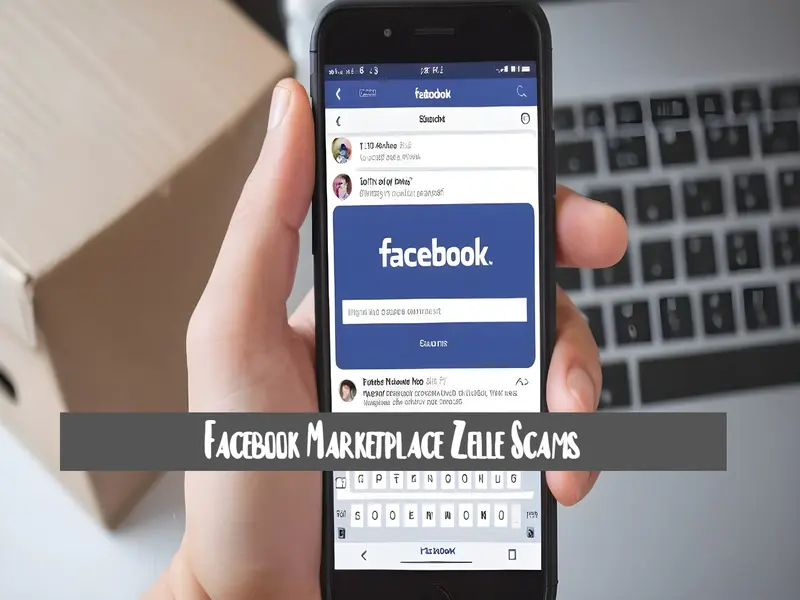Beware of the Zelle Facebook Marketplace scam, as the Better Business Bureau highlighted. Scammers, posing as buyers, target sellers by attempting to purchase expensive items using Zelle, a popular peer-to-peer payment app. Sellers are advised to exercise caution and to avoid falling victim to this fraudulent scheme.
What Is Zelle?
Zelle is a digital payments platform gateway that enables users in the United States to send and receive money quickly and securely through their mobile banking apps.
Launched in 2017, Zelle allows direct bank-to-bank transfers, facilitating transactions between individuals and businesses. Buyers can link their bank accounts to the Zelle app, sending funds to contacts conveniently using only their email address or phone number.
It has become widely adopted by many major banks and financial institutions, providing a convenient and efficient way for users to transfer money seamlessly.
Read also: Scam-Free Shopping: Your Complete Guide to Facebook Marketplace
Zelle Business Account Scam: How It Works
Impersonation: Scammers impersonate legitimate businesses, creating a false sense of trust.
Fake Websites: They may establish fake websites resembling official business pages with logos and contact information.
False Offers or Services: Scammers offer products or services, often at attractive prices, to lure victims into engaging with them.
Zelle Payment Requirement: The scam unfolds by insisting on Zelle payments, claiming it’s the only accepted method or offering discounts for using Zelle.
No Product Delivery: Victims make Zelle payments, but scammers never deliver the promised products or services.
Vanishing Act: After receiving payments, scammers disappear, making it challenging for victims to trace or recover funds.
Pressure Tactics: Victims may experience pressure tactics, urging quick decisions or immediate payments to secure supposed deals.
Limited Recourse: Zelle transactions lack the same buyer protections as credit cards, leaving victims with limited recourse for recovering lost funds.
Educational Outreach: Raising awareness about the scam is key to preventing others from falling victim to similar schemes.
Verify Businesses: Always verify the legitimacy of businesses independently and avoid making payments solely through Zelle, especially if pressured to do so abruptly.
Read also: How to Create WhatsApp Group on iPhones, Android, and Desktop
How can someone scam you through Zelle?
While Zelle is a generally secure and widely used digital payment platform, there are potential ways scammers could attempt to exploit it. Here are some common tactics scammers may use:
Fake Goods or Services: Scammers may pose as legitimate sellers on platforms like online marketplaces. They might request payment through Zelle but have yet to deliver the promised goods or services.
Phishing: Scammers can use phishing techniques, such as sending fake emails or messages appearing to be from Zelle, to trick individuals into providing their login credentials or personal information.
Impersonation: Scammers may impersonate someone you know or trust, claiming they need urgent financial assistance. They might request funds through Zelle, taking advantage of the urgency to manipulate victims.
Overpayment Scams: In a transaction, a scammer may claim they accidentally sent too much money and ask you to refund the excess amount. Once you return the funds, the initial payment they sent could be reversed or found to be fraudulent.
Fake Buyer/Seller Scenarios: Scammers may pretend to be buyers or sellers when dealing with online transactions. They could convince you to send the product before payment or pay before receiving the item, leaving you with no recourse.
Hacked Accounts: Scammers might gain unauthorized access to someone’s Zelle account and initiate transactions without the account holder’s knowledge.
Read also: How to Sell and Buy in Facebook Marketplace Louisville Ky
How to Protect you from Zelle Facebook Marketplace scams
Verify User Identities
- Double-check the identity of the person you’re dealing with on Zelle or Facebook Marketplace.
- Confirm their profile information and ensure it matches their communication.
Use Secure Payment Methods
- Prefer using secure payment platforms provided by Zelle or Facebook Marketplace.
- Avoid sharing sensitive information like bank details directly through messages.
Meet in Person for Transactions
- Whenever possible, conduct transactions in person to ensure the deal’s legitimacy.
- Choose safe, public locations for exchanges.
Beware of Red Flags
- Watch out for suspicious behaviour or requests, such as urgency, unusual payment methods, or requests for personal information.
Research and Reviews
- Research the seller or buyer by checking their reviews or ratings on the platform.
- Look for feedback from other users to gauge their trustworthiness.
Report Suspicious Activity
- Report any suspicious users or transactions to the platform.
- Help create a safer community by sharing information about potential scams.
Educate Yourself
- Stay informed about common scams and tactics used by fraudsters.
- Be proactive and cautious in protecting your personal and financial information.
If you are suspicious of fraudulent activity, immediately report it to Zelle and your bank. Being proactive and vigilant is crucial in preventing scams and protecting yourself using digital payment platforms like Zelle.
How to Recognize Zelle Facebook Marketplace Scams
The only domain extensions used by Zelle ® are @Zelle.com or @Zellepay.com. Zelle ® does not use <@gmail.com> or any other domain such as <@aol.com>, <@yahoo.com>, or any other common email domain. Even if the profile picture contains the Zelle ® logo, it automatically means the email is not valid.
- Too Good to Be True
- It might be a scam if a deal seems too good or unbelievably cheap.
- Scammers often use tempting prices to lure victims.
- Pressure Tactics
- Scammers may rush you to make quick decisions.
- Be cautious if they push for immediate payment.
- Communication Red Flags
- Look out for bad grammar and spelling mistakes in messages.
- Scammers may avoid phone calls or in-person meetings.
- Fake Listings
- Check for inconsistent details or images that seem stolen from the internet.
- Verify the existence of the product outside of Facebook.
- Unusual Payment Requests
- Be cautious if asked to pay through Zelle instead of more secure methods.
- Scammers prefer Zelle as it is difficult to trace.
- No Meet-Up Option
- If the seller avoids meeting in person, it could be a scam.
- Legitimate sellers are usually open to face-to-face transactions.
- Personal Information Requests
- Be sceptical if the seller asks for excessive personal information.
- Scammers may use this data for identity theft.
- Check Seller’s Profile
- Verify the seller’s Facebook profile, including their friends and activities.
- A recently created or suspicious profile might be a red flag.
- Too Many Excuses
- Be cautious if the seller provides many excuses for not meeting or delays.
- Scammers often use excuses to avoid face-to-face interactions.
- Listen to Your Instincts
- If something feels off, trust your instincts and reconsider the transaction.
- It’s better to be safe than sorry; there will be other opportunities.
Remember, it’s essential to prioritize safety and conduct transactions with caution on online platforms like Facebook Marketplace.
Zelle Facebook Marketplace Scams: How to Avoid Them
Verify User Profiles
- Check the seller’s Facebook profile; ensure it looks legitimate and has been active.
- Look for a profile picture, multiple photos, and posts to validate their existence.
Communication within Facebook
- Keep all communication within the Facebook Messenger platform.
- Avoid sharing personal information like email addresses or phone numbers right away.
Beware of Unrealistic Deals
- Be cautious of deals that seem too good to be accurate; scammers often lure you with unrealistically low prices.
- Compare prices of similar items to gauge the market value.
Use Zelle Safely
- Only use Zelle for transactions if they are local, in-person exchanges.
- Only send money through Zelle to unknown sellers if meeting face-to-face.
Meet in Public Places
- Arrange to meet in a safe and public location during daylight hours.
- Bring a family or friend member for added security.
Inspect the Item
- In-depth inspection of the item before making any payment.
- Request additional pictures or details if needed.
Trust Your Instincts
- If something feels off or too rushed, reconsider the transaction.
- Scammers often pressure buyers into quick decisions.
Check Zelle Details
- Verify the Zelle account details with the seller in person.
- Confirm the recipient’s information before initiating any transfer.
Never Send Advance Payments
- Avoid making advance payments or deposits before seeing the item in person.
- Legitimate sellers will not typically require upfront payments.
Report Suspicious Activity
- Report any suspicious behaviour or profiles to Facebook.
- If you encounter a scam, report it to Zelle and your local authorities.
Trust Local Transactions
- Prefer dealing with local sellers to minimize the risk of scams.
- International transactions can be riskier and more complex to verify.
Educate Yourself
- Stay well-educated about common scams and fraud tactics.
- Being informed of potential risks will help you make safer transactions.
Stay informed about common Zelle scams and be vigilant to new tactics, enhancing your ability to recognize and avoid potential fraud.
Read also: Facebook Marketplace Local Only: How to Change Location & Use It
FAQs: Zelle Facebook Marketplace Scams
Are there Zelle scams Facebook Marketplace?
Yes, there have been reported cases of Zelle scams Facebook Marketplace. The BBB has issued an alert warning to the seller on Facebook Marketplace.
Do you tell if someone is scamming you with Zelle?
To identify Zelle scams, watch for red flags such as requests for updated account info or verification, unusual business transactions, and refund requests from unfamiliar sources. Be cautious and avoid sharing sensitive information.
Is it secure to accept Zelle payments from strangers?
Accepting Zelle payments from strangers isn’t safe. Zelle recommends using the app with trusted individuals only. Accepting payments from unknown sources is risky, mainly when selling items online.
Is Zelle secure for sellers?
While Zelle takes data security seriously, they take no responsibility for users who fall prey to scammers and authorize payments to impersonators. So, regarding safety for you and your customers, some constraints exist to use Zelle for business.
Will Zelle refund money if scammed?
Zelle processes scam claims case by case but doesn’t guarantee refunds. Victims must file claims with Zelle and their bank. Refunds depend on investigation outcomes.
Can someone fake Zelle?
Yes, someone can fake Zelle. A common scam is a fake email pretending to be from Zelle requesting payment for a non-existent account upgrade. Be cautious of such scams.
Who owns Zelle?
Zelle is owned by a private financial services company that counts Bank of America, Truist, Capital One, JPMorgan Chase, PNC Bank, U.S. Bank, and Wells Fargo among its shareholders.
Can I use Zelle without a bank account?
You can only use Zelle with a bank account. Zelle enables direct money transfers between bank accounts in the U.S. Either the receiver or sender must have access to Zelle through their bank or credit union.
Conclusion
Zelle Facebook Marketplace scams underscore the importance of attention and caution when engaging in online transactions. The Better Business Bureau (BBB) has mentions and issued alerts about potential scams involving Zelle, emphasizing the need for users to be aware of the risks. To protect from falling victim to such scams, it is advisable to avoid transactions that raise suspicion or seem too good to be true.
Scammers often rely on individuals needing to pay more attention to their tactics, making it crucial for buyers and sellers to exercise diligence and follow best practices. Prioritizing safety, using secure payment methods, and verifying the legitimacy of transactions can contribute to a more secure experience on platforms like Facebook Marketplace. By staying informed and alert, users can reduce the risk of falling prey to Zelle scams and other fraudulent activities in the online marketplace.

